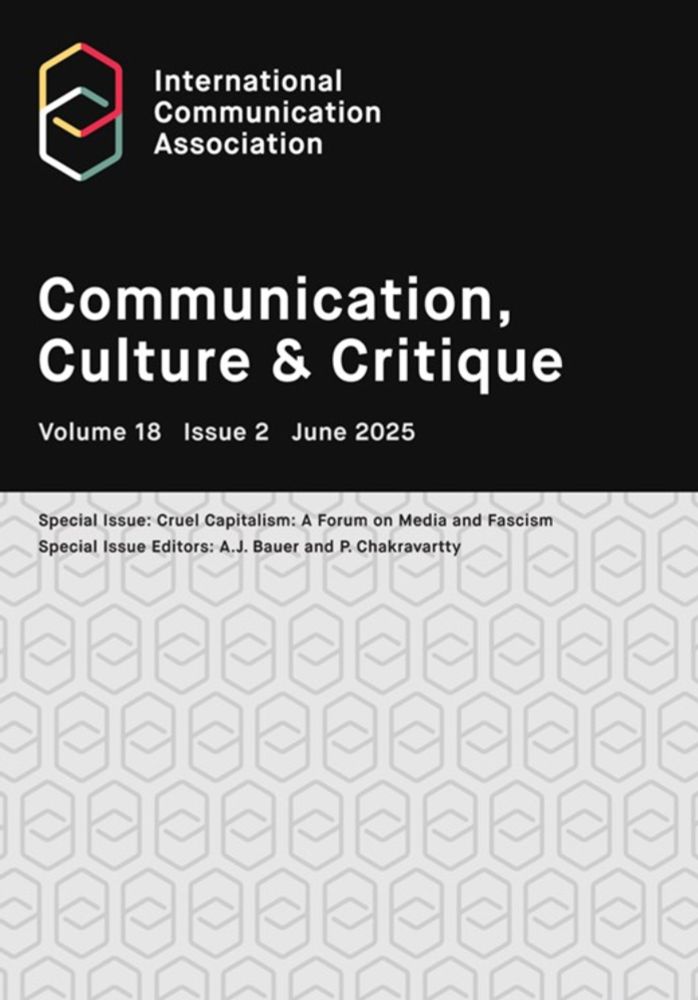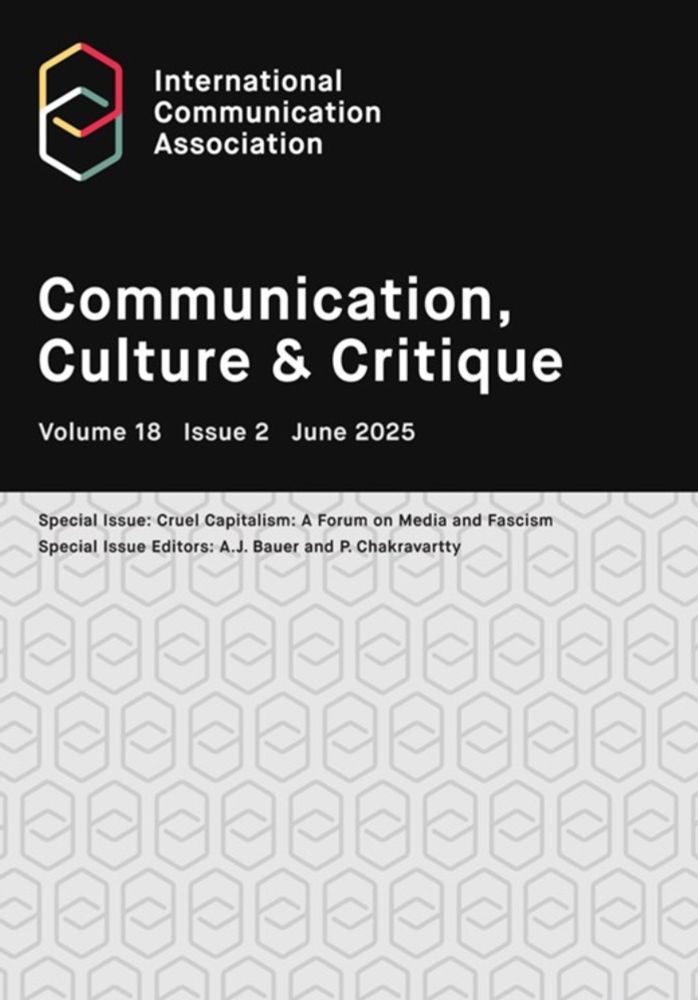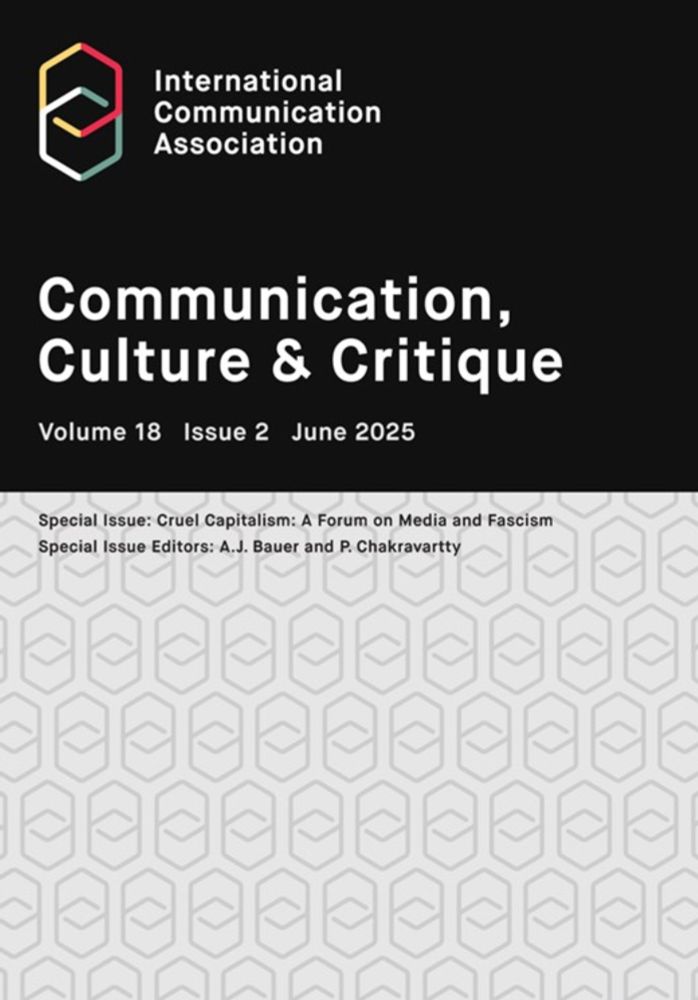
Journal Article
Tips for getting your work published by an overworked journal editor
Isabel Molina-Guzmán
Communication, Culture and Critique, Volume 18, Issue 4, December 2025, Pages 294–296, https://doi.org/10.1093/ccc/tcaf049
Published:
26 December 2025
Abstract
In this article, I discuss the constraints today’s journal editors are facing to help authors understand what they can do to more effectively manage the process. Specifically, I share advice with authors for improving the success rates of interdisciplinary and early career scholars. I conclude with a brief discussion of my journey into editing as way to open pathways for others interested in journal editing.
Up next in our forum "Dismantling the Master's House," featuring essays on peer review of intersectional scholarship, we have Isabel Molina-Guzmán.
"Tips for getting your work published by an overworked journal editor"
Check it out!
academic.oup.com/ccc/article/...
16.02.2026 18:10 — 👍 3 🔁 3 💬 0 📌 0

Journal Article
A Black sensibility for intersectional scholarship
by Meshell L Sturgis
Communication, Culture and Critique, Volume 18, Issue 4, December 2025, Pages 292–293, https://doi.org/10.1093/ccc/tcaf043
Published:
26 December 2025
Abstract
Most advice on how to write critical theory tends to focus on the logistics. Taking the perspective that writing is a skill rather than a talent, such approaches tend to overlook the presence and consequences of emotions in writing. Intersectional scholarship entails navigating and cultivating relations, rituals, and evolving emotional states from the most private to the more generalizable. This essay documents just some of the feelings experienced by one queer Black woman who studies race and communication in the United States. It begins with Black feminist theorizing about writing, research, and the embodiment of intersectional harm. Then, it captures discrete writing experiences and some of the emotions paired with such experiences over the course of the author’s writing career. Finally, it ends with a poetic reveal of writing habits to distill some of the sensory inputs and emotional underpinnings of a Black feminist writing praxis.
Up next in our forum "Dismantling the Master's House," featuring essays exploring new directions for peer review of intersectional scholarship, we have Meshell L. Sturgis.
"A Black sensibility for intersectional scholarship"
Check it out!
academic.oup.com/ccc/article/...
13.02.2026 22:04 — 👍 2 🔁 1 💬 0 📌 0

Journal Article
Grounded under a Blue Sky: tools for disrupting the peer review process as we know it Purchased
by Meredith D Clark
Communication, Culture and Critique, Volume 18, Issue 4, December 2025, Pages 290–291, https://doi.org/10.1093/ccc/tcaf051
Published:
26 December 2025
Abstract
This article provides an introduction to a scholarly forum on intersectional approaches to challenging the peer-review process. Developed out of a Blue Sky session at the International Communication Association’s annual conference in 2025, the article and the forum discuss ways to build out of the strength of differences with practical insights that can be adopted throughout the publication process to advance critical scholarship.
Check out our latest forum, "Dismantling the Master's House" featuring essays exploring new directions for peer review of intersectional scholarship.
It kicks off with an introductory essay from Meredith D. Clark, "Grounded Under a Blue Sky." A must read!
academic.oup.com/ccc/article/...
12.02.2026 18:04 — 👍 4 🔁 3 💬 0 📌 0

Eroding the market’s hidden hand: toward a Post-Capitalist media system
Abstract. Media-related problems facing democratic societies around the world today often stem from various kinds of market failures and structural limitat
Check out @victorpickard.bsky.social's contribution to our forum on Left Democratic Futures, on the urgent need for post-capitalist media in a world where corporate media and big tech have clearly and spectacularly failed us.
academic.oup.com/ccc/article/...
29.01.2026 17:53 — 👍 4 🔁 2 💬 0 📌 0

It is impossible to reorient the operation of a society’s economic life in an anticapitalist path without a decisive presence from the state. Yet the ever-growing presence of the state in society causes a progressive stifling of democratic spaces. This is the dilemma that was posed at that time and it is the dilemma that frames the processes of change today. To put it bluntly: bread and democracy seem to be mutually exclusive concepts; all that is left is to opt for one or the other. During these long years, the Latin American left – and not only the Latin American left, of course – justified “real” socialism on the basis of the admission that it had been able to solve the same persistent issues affecting the people of Latin America. According to it, those who, also from the left, insisted on speaking about democracy did so with the narrow-minded goal of denying the conquests achieved by socialism – in the end, who cared about those miserable bourgeois freedoms, like reading the newspaper of one's choice, compared to the countless benefits that socialism gave to humanity!

Today, this terrible quid pro quo has blown up. Because it is not true that socialism assures the historical necessities of men and women by amputating their fundamental freedoms. In the long run, this amputation hampers the fulfilment of historical necessities. Today, the crisis of socialism is showing us that it is impossible to draw a dividing line between bread and democracy, because, in doing so, socialism itself disappears. In increasingly complex modern societies, it seems as though socialism cannot make headway based on an enlightened confidence in the abilities of reason to create progress, but rather the opposite, on questioning, to the fullest, its neocapitalist recuperation. It is only by questioning the harmoniousness of socialist models that we can admit social conflictiveness and political interaction as irrepressible phenomena of all future – and therefore present – societies. Socialism resets recompone the dialecticity of its relationship with democracy by incorporating pluralism (political, organisational, ideological, cultural, etc.) as its own irrepressible value; but in doing so, it radically questions all concrete socialist experiences.

Socialists have no practical solutions, nor Marxists theoretical answers, to all these issues. But I wonder: Does anyone have them, or did anyone ever have them? Is capitalism an answer? Are we not witnessing the fall of the ideological paradigms on which bourgeois societies were constructed? Are we not beginning to accept the idea of the un-governability of such societies? At the same time, does the firm questioning of current socialist experiences mean we are negating the gains in the growth and redistribution of resources? Put another way, does it mean we must renounce any programmatic and society-centered reconstruction project of society? Is there a third way that would allow us to escape capitalism to construct a more egalitarian – but also infinitely freer and more democratic – society? This is where, I think, the debate turns into a vicious circle and shows itself completely incapable of moving forward in novel paths. It is here, too, that we are unable to prevent ourselves from either dashing for utopia or accepting cynically the state of things. It is here where, in total good faith but with maximum critical faculty, we must learn to measure ourselves against the facts.
In light of the Trump administration's renewed imperialism in Latin America, it's worth revisiting the insights of José Aricó.
In our latest forum on "Left Democratic Futures," we include a republication of his 1980 essay “Neither Cynicism nor Utopia.”
08.01.2026 19:09 — 👍 7 🔁 3 💬 1 📌 0
Validate User
The interview is part of our Forum on Left Democratic Futures. See the other contributions here:
academic.oup.com/ccc/issue/18/4
06.01.2026 17:52 — 👍 0 🔁 0 💬 0 📌 0

Protestors in a city park holding signs reading "JIN JIYAH AZADI" and "FEMINISTS FOR JINA" and "From Iran to Palestine, End the War, End the Crime" among other slogans.
OPEN ACCESS!
In our latest issue, @manijehm.bsky.social interviews Iranian left feminist activist Neda Naji on resisting authoritarianism and imperialism.
academic.oup.com/ccc/article/...
06.01.2026 17:52 — 👍 9 🔁 3 💬 2 📌 0

Eroding the market’s hidden hand: toward a Post-Capitalist media system
Abstract. Media-related problems facing democratic societies around the world today often stem from various kinds of market failures and structural limitat
In his recent essay for @ccc-journal.bsky.social, @victorpickard.bsky.social analyzes the capitalist logics at the root of many media-related issues and provides a framework for shifting to a less capitalist, more democratic media system.
Read here: buff.ly/AYvibor
05.01.2026 20:02 — 👍 5 🔁 4 💬 1 📌 0
Validate User
Here's a link to the full call with submission instructions!
academic.oup.com/ccc/pages/jo...
28.08.2025 13:50 — 👍 1 🔁 0 💬 0 📌 0

Call for Papers
Journalism in Ruins: Interrogating norms of ‘independent’ journalism
Thematic Issue for Communication, Culture & Critique (2026/27)
Abstract Deadline (500 words): December 15, 2025
Complete Manuscript Deadline (7,000-8,000 words): June 15, 2026
Co-editors: Natalie Fenton (Goldsmiths, University of London), Srirupa Roy (University of Göttingen)

Rationale
This thematic issue critically interrogates the normative ideal of an independent journalism that drives contemporary laments for a “journalism in ruins.” Normative liberal understandings of news have often declared independent news production as the holy grail of media freedom. A free media is in turn associated with a healthy democracy. Independence of news organizations from government pressure or interference in news production is considered vital to democracy’s well-being. Independence of journalism from wealthy sponsors or corporate pressures is seen as key to its integrity. In turn, independent news media are hailed as the ultimate democratic horizon (Fenton, 2025). An entrenched belief of Anglo/Western liberal media systems, the norm of ‘independent journalism’ also exerts a powerful influence across much of the postcolonial South (Mustvairo et al., 2021).
Yet, the mythology of a ‘free’ news media sustaining ‘liberal’ democracy has long since been exposed as exhausted at best, and as absolving of truths at worst. Corruption and compromise have come to the fore as political and commercial interests merge and expand. It is now beyond doubt that a media and tech system that may have many platforms and points of distribution but is dominated by a few, powerful voices and a news media increasingly run to secure financial reward or political influence is highly unlikely to foster greater democratic participation in political culture (Pickard, 2019). Indeed, journalism is arguably now more often subject to fear and favor than without it despite claims to the contrary. As liberal democracy flounders, as legal frameworks fail to deliver journalistic protections, as free expression becomes the preserve of the powerful, as good governance gives way to commercialism at all costs and mechanisms of accountability seek to preserve privilege rather than uphold standards, then the ideal of independent journalism flails too.
So why do many scholars and journalist…

These concerns are even more pertinent as mainstream news organizations around the world face multiple challenges from both state and commercial forces, resulting in their closure and constriction and as attacks on journalists increase. As calls of fake news, mis/disinformation abound, so public trust in journalism has plummeted in many places. Yet in the face of such existential challenges, the mainstream journalistic vanguard reaches once more for a return to ‘core values’ aligned with liberalism’s promises to expose the truth with little regard for the systemic forces (of commercialism, marketisation, elite capture, and political entanglement) that have evaded such truth-making claims from being realized. As journalism retreats to its safe default space of hegemonic values and claimed conformity of standards such as ‘objectivity’, ‘impartiality’ and ‘independence’ so it fails to acknowledge the structures and practices that ensure these spaces are too often distorted by money, power and privilege and hence are also heavily classed, gendered and racialized. How has this ‘high modernism’ (Hallin, 2006) of journalism managed to prevail and largely ignore critiques of power relations and geopolitical context and what does it mean for a journalism in ruins?
This Thematic Issue seeks to interrogate these concerns: Crucially, it asks, what if the pilgrimage for journalistic independence is treading the wrong path, directing us away from interrogating power relations that exist and blinkering our visions of what journalism could become? If news and journalism are always situated in relation to and interact with other organizations, institutions, professions and people, would we be better placed to interrogate the relations of power therein and establish the levels of interdependence that exist in order to determine how these interdependencies can be recognized, better understood and managed? How can journalism studies move beyond liberal conceptions of the public sphere…
Critical journalism studies folks!
We're looking for contributors to a new special issue: "Journalism in Ruins: Interrogating norms of ‘independent’ journalism." Editors: Natalie Fenton and Srirupa Roy.
Abstracts due Dec. 15, 2025.
28.08.2025 13:50 — 👍 12 🔁 8 💬 1 📌 1
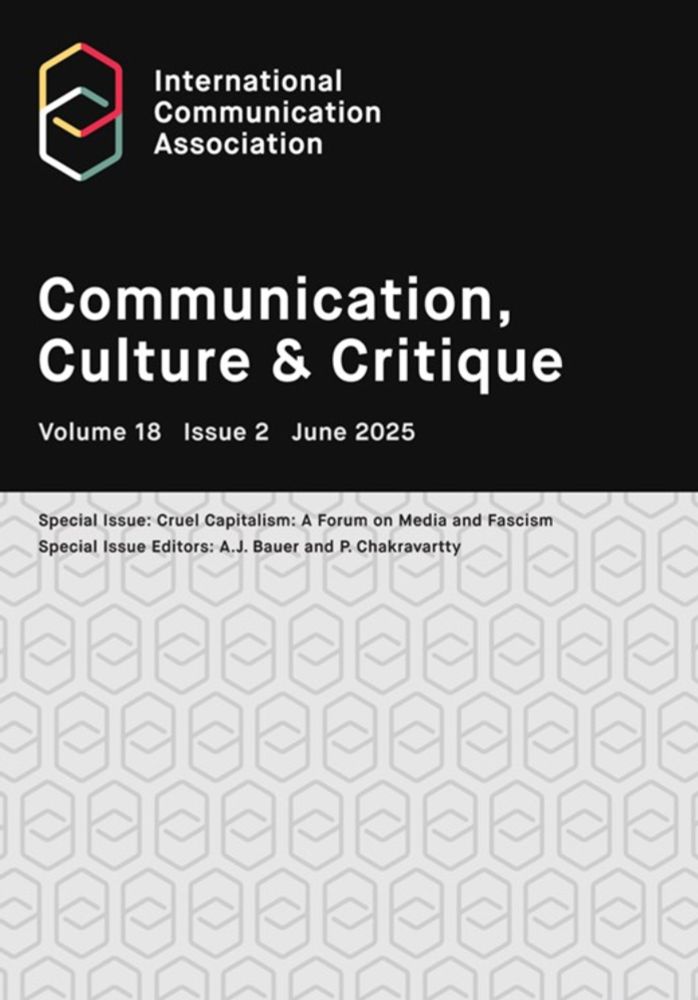
The roots of reactionary tech oligarchy and the need for radical democratic alternatives
Abstract. The aim for this commentary is two-fold: first, we seek to outline how decades of liberal “post-democratic” hegemony—prevalent across liberal dem
As part of this month's forum on Media & Fascism, @jfarkas.bsky.social and @aurelmondon.bsky.social explore the rise of reactionary tech oligarchy and why liberalism, journalism, and the Internet aren't the bulwarks they might seem. Check it out!
doi.org/10.1093/ccc/...
30.06.2025 13:26 — 👍 19 🔁 9 💬 0 📌 0
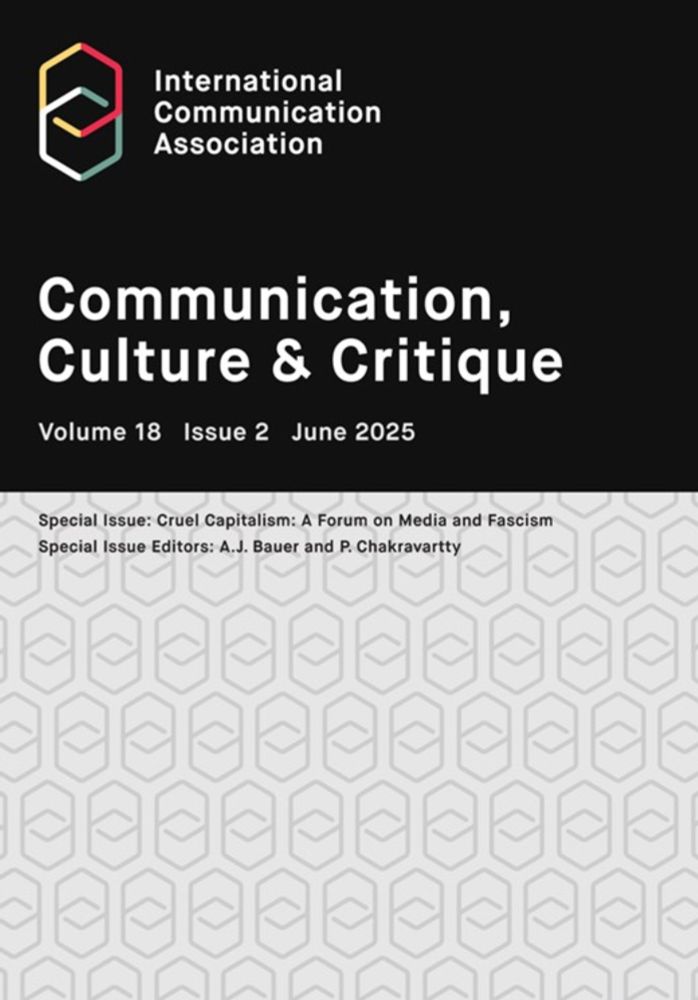
More than money and algorithms: the cultural roots of Trump’s alt-media strategy
Abstract. This article examines Trump’s masculinist “alt-media strategy” in the 2024 election to explore the right’s dominance in the online media landscap
As part of this month's forum on Media & Fascism, @reecepeck.bsky.social explores Trump's alt-media strategy and shows why we need more historically engaged analyses of political communication strategy and tactics. Check it out!
doi.org/10.1093/ccc/...
26.06.2025 15:32 — 👍 3 🔁 2 💬 0 📌 1
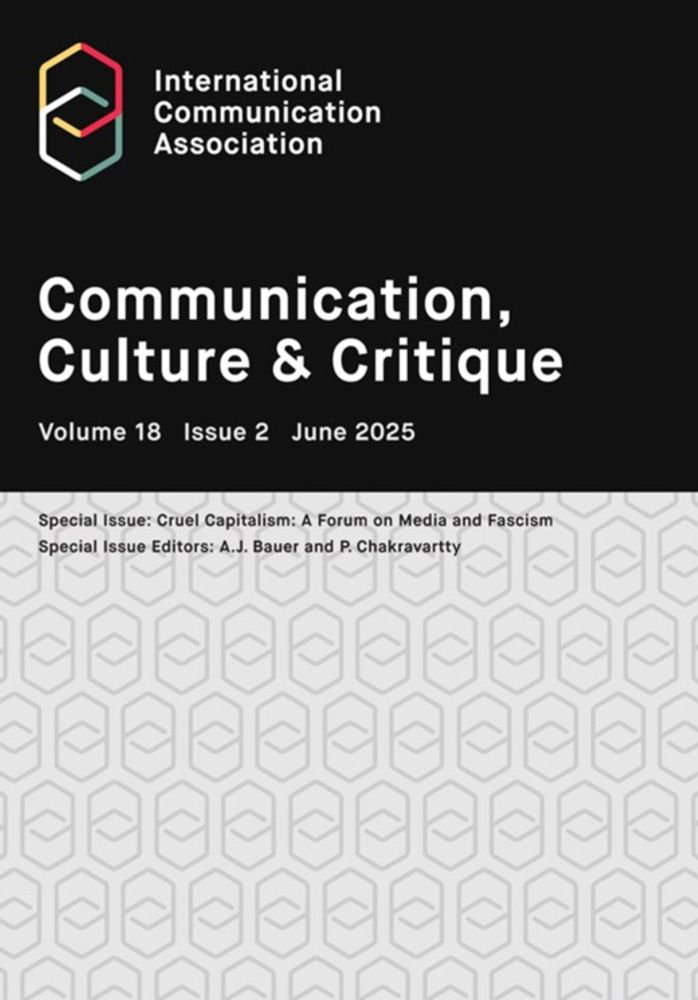
Media reconstruction and reparative media
Abstract. Drawing from the work of scholar-activist W.E.B. Du Bois and insights from co-creating a community-based media platform, this article demonstrate
As part of this month's forum on Media & Fascism, @ajescoffery.bsky.social explores how experimental, community-based media practices can help us revitalize and reconstruct democracy. Check it out!
doi.org/10.1093/ccc/...
26.06.2025 13:20 — 👍 8 🔁 3 💬 0 📌 1
Mis/Disinformation Studies folks!
This is an excellent meditation on the political limitations of debunking and on how we might respond otherwise. Even if you're not a queer/trans studies person, this piece is well worth the read!
05.06.2025 13:26 — 👍 38 🔁 13 💬 2 📌 2

Kamala is for they/them: liberalism, fascism, and nonsense
Abstract. The slogan that the Trump campaign used in the 2024 US presidential election to tie rival Kamala Harris to trans activists in its television ads—
🚨OPEN ACCESS🚨
As part of our new forum on "Media and Fascism," @cassiusa.bsky.social writes about how trans cultural production might best answer the ascendant fascist aesthetics of nonsense and sensation.
There's no paywall, check it out!
academic.oup.com/ccc/article/...
05.06.2025 13:12 — 👍 14 🔁 7 💬 0 📌 3
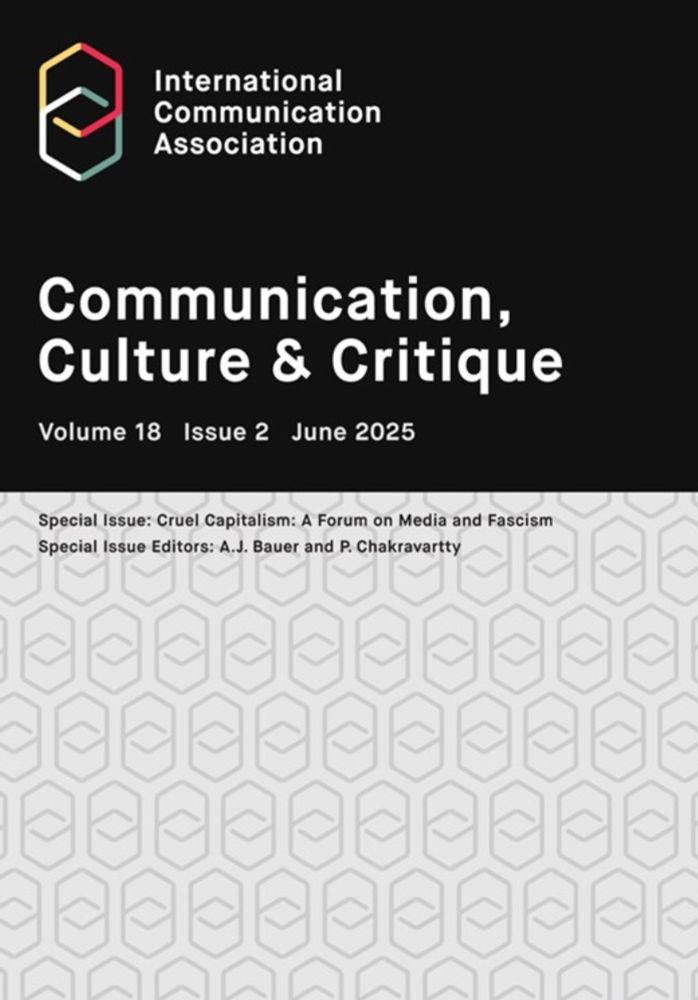
Cruel capitalism: a forum on media and fascism
Abstract. This article introduces a forum on “Media and Fascism” by reading tech oligarch and right-wing political operative Elon Musk as a nexus of intern
Our June issue is now live! It kicks off with a forum on Media and Fascism, featuring a star-studded list of contributors.
Get started with this introduction by forum editors @paulachak.bsky.social and @ajbauer.bsky.social!
academic.oup.com/ccc/article-...
04.06.2025 13:41 — 👍 10 🔁 6 💬 0 📌 2
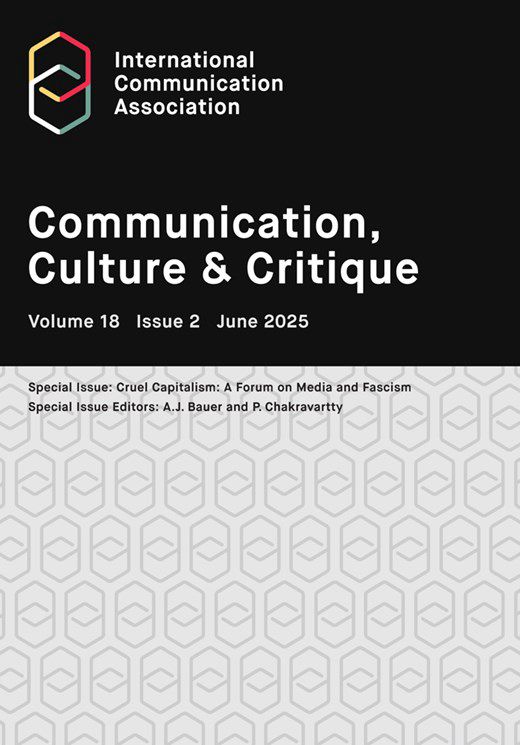
Cruel capitalism: a forum on media and fascism
Abstract. This article introduces a forum on “Media and Fascism” by reading tech oligarch and right-wing political operative Elon Musk as a nexus of intern
Check out CCC’s latest forum on “Cruel Capitalism: Media and Fascism” co-edited with @ajbauer.bsky.social in
@ccc-journal.bsky.social!
Essays on trans culture, the central role of Christian Zionism, masculinity and alt media, reparative and abolitionist futures, and more!
doi.org/10.1093/ccc/...
03.06.2025 19:17 — 👍 5 🔁 4 💬 0 📌 0
Must read from colleagues in the latest issue of Communication, Culture and Critique.
03.06.2025 19:09 — 👍 6 🔁 2 💬 1 📌 0
This was so fun to write! Using Du Bois and reconstruction to talk about how media could help us survive authoritarianism.
03.06.2025 18:57 — 👍 25 🔁 9 💬 0 📌 0
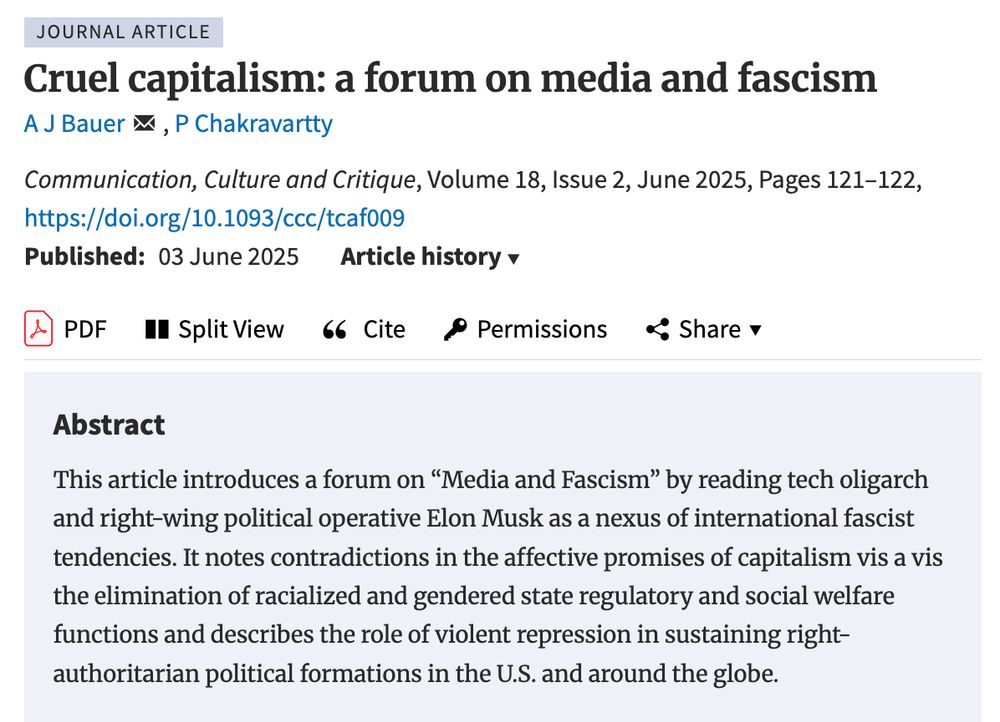
Cruel Capitalism: a forum on media and fascism by AJ Bauer and Paula Chakravartty in Communication, Culture and Critique: This article introduces a forum on "media and fascism" by reading tech oligarch and right-wing political operative Elon Musk as a nexus of international fascist tendencies. It notes contradictions in the affective promises of capitalism vis a vis the elimination of racialized and gendered state regulatory and social welfare functions and describes the role of violent repression in sustaining right-authoritarian political formations in the US and around the globe.
Check out my latest, with @paulachak.bsky.social, in @ccc-journal.bsky.social!
It introduces a forum we co-edited on "Media and Fascism," with a star-studded lineup! See the 🧵 below:
doi.org/10.1093/ccc/...
03.06.2025 18:55 — 👍 35 🔁 17 💬 1 📌 3
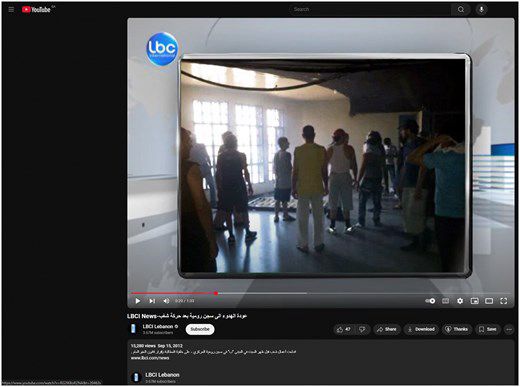
Prison media mobilization: smuggled technologies and media practices in Lebanese carceral spaces
Read our latest article by @chaficnajem.bsky.social'on smuggled digital technologies and how incarcerated people in Lebanon make their voices heard. With lessons for those interested in abolition media everywhere! Now available from @ccc-journal.bsky.social!
doi.org/10.1093/ccc/...
23.05.2025 15:23 — 👍 7 🔁 3 💬 0 📌 0
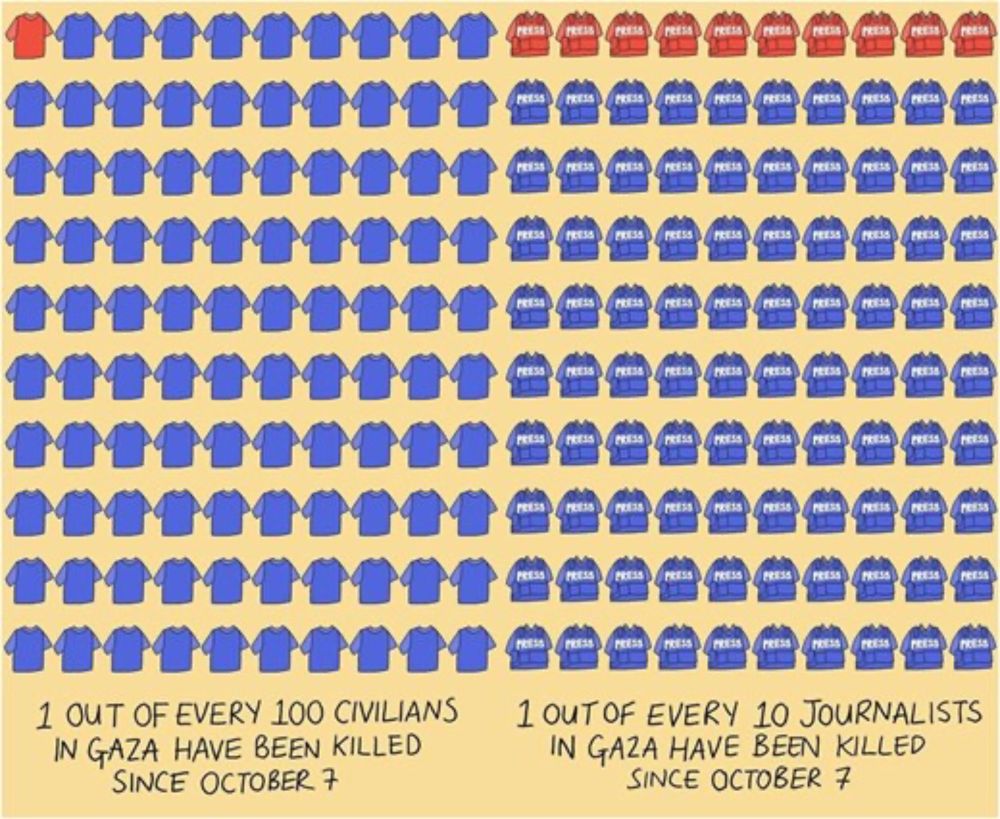
A statement on the ongoing genocide in Gaza
Abstract. Communication, Culture and Critique has been the leading venue for critical approaches to communication and media studies. This issue marks the f
In know that there have been a few exceptions in the international community, most importantly the “statement on the ongoing genocide in Gaza” by the Editorial Collective of Communication, Culture and Critique (@ccc-journal.bsky.social): academic.oup.com/ccc/article-...
03.06.2025 18:38 — 👍 3 🔁 1 💬 1 📌 0
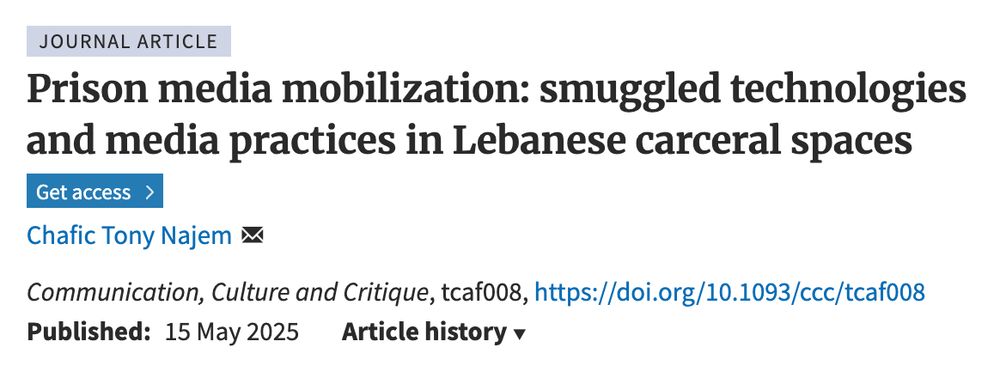
Prison media mobilization: smuggled technologies and media practices in Lebanese carceral spaces by Chafic Tony Najem in Communication, Culture and Critique, published 15 May, 2025
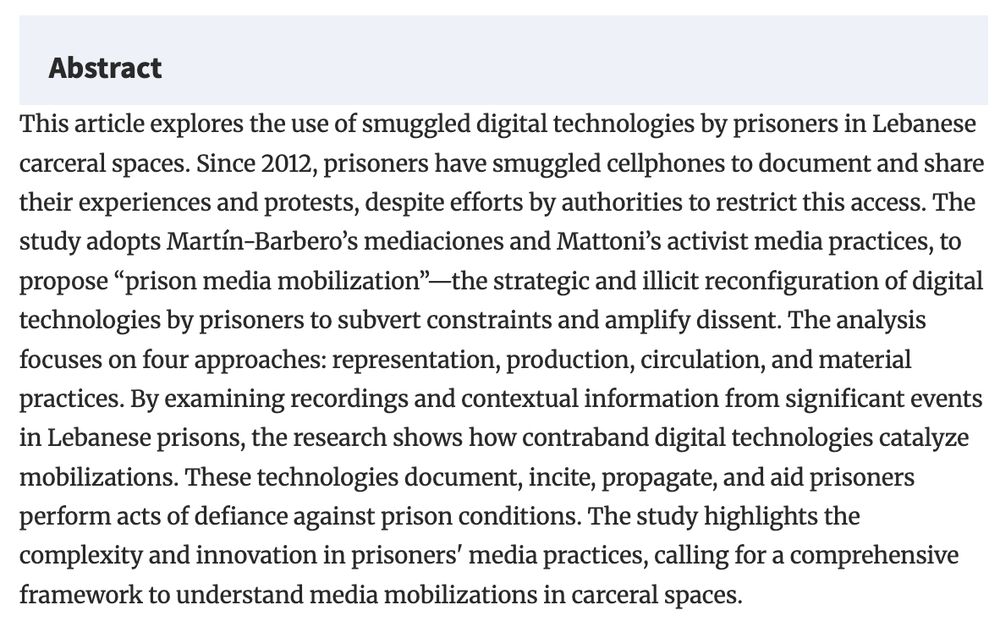
This article explores the use of smuggled digital technologies by prisoners in Lebanese carceral spaces. Since 2012, prisoners have smuggled cellphones to document and share their experiences and protests, despite efforts by authorities to restrict this access. The study adopts Martín-Barbero’s mediaciones and Mattoni’s activist media practices, to propose “prison media mobilization”—the strategic and illicit reconfiguration of digital technologies by prisoners to subvert constraints and amplify dissent. The analysis focuses on four approaches: representation, production, circulation, and material practices. By examining recordings and contextual information from significant events in Lebanese prisons, the research shows how contraband digital technologies catalyze mobilizations. These technologies document, incite, propagate, and aid prisoners perform acts of defiance against prison conditions. The study highlights the complexity and innovation in prisoners' media practices, calling for a comprehensive framework to understand media mobilizations in carceral spaces.
Check out @chaficnajem.bsky.social's latest on smuggled digital technologies used by incarcerated people in Lebanon, now available from @ccc-journal.bsky.social!
doi.org/10.1093/ccc/...
23.05.2025 14:36 — 👍 5 🔁 2 💬 0 📌 1
If you are trying to figure out how to make sense of authoritarian turn, read this thoughtful review by @jfarkas.bsky.social and @bilgeyesil.bsky.social new book on Turkish mediated authoritarianism and how to contest its hold..
23.04.2025 16:35 — 👍 9 🔁 4 💬 0 📌 0
Professor who writes about the history and political economy of media, politics of media policy, and democratic theories of journalism. Author of "Democracy Without Journalism? Confronting the Misinformation Society." Co-director of the MIC Center at Penn.
Writing and teaching media history and promotional culture, cartoons, ephemera.
professor @ Northwestern
affiliate @ Harvard Berkman Klein
jury @ Peabody Awards
co-founder @weareotv
BOOKS:
Reparative Media, MIT Press Fall 2025
Media Reparations, coming soon on Polity
The Cookout, out now ⬇️
http://linktr.ee/ajescoffery
Advisor Green Screen Coalition • PhD Communications UFRJ (Brasil) • Former Senior Fellow AI @Mozilla • Climate Justice • Political econony of AI, energy and digital critical infrastructures • Espírito Santo / Brasília, Brasil https://olink.ai/eco-midia
Ignore my late night posts.
Award winning author!
I study Black Twitter: goo.gl/Wc98bf
…and digital methods: goo.gl/0njUPf
Openly Black.
Still on The Bird App as *thot leedurr*
andrebrock.academia.edu
post-doc fellow @IAS_NUQ
formerly @mediastudies_su & Royal Institute of Art Stockholm
Assistant Professor. Author of 'Post-Truth, Fake News and Democracy' (https://t.ly/1JHye), University of Copenhagen, Firstgen 🎓. he/him. Free access to my work: http://www.johanfarkas.com/research
Postdoc @asc.upenn.edu @miccenter.bsky.social
PhD from @bellisariograded.bsky.social | SSHRC doctoral fellow | @ifsfrankfurt.bsky.social fellow | Political Economy of Comm | Critical Theory | Media Policy | 🇨🇦
https://www.sydneyforde.com/
Views are my own. 🇨🇦 in 🇺🇸
Researches: platform studies / communication technologies / digital media + cultures
PhD Candidate
School of Communication | Simon Fraser University
💬 Feminist Media Studies
💬 Social Movements
Prof in New York, studies broken media, capitalism and anti-colonial futures.
translator // counter-cartographer // feminist geographer
https://www.commonnotions.org/the-home-as-laboratory
https://territoriodeideas.com/
https://www.countercartographies.org/
political science @ Western Connecticut State University || union member || deeply concerned
prof of media studies @fordhamnyc • studying media ecologies of race and place • phd @mccnyu • whitney isp • posts don't reflect the views of my employer
Assistant Professor in the Department of Communication and Journalism, Texas A&M University
Past: UNC CITAP, UW-Madison SJMC
Prof, researcher UNC CITAP, Tech + Politics.
Associate professor of political communication @ddc-sdu.bsky.social, University of Southern Denmark.
Focus on digital & right-wing media + parties.
Associate Editor @ International Journal of Press/Politics
Official account of the @APSAtweets & @icahdq #PolComm Divisions | posts by @igoncalves.com | https://www.facebook.com/groups/politicalcommunication.org | @polcomm@mastodon.social | https://politicalcommunication.org/
Digital Journalism is an international, peer-reviewed, top-ranked journal that publishes cutting-edge research and concepts. Editor-in-Chief: Oscar Westlund.
https://www.tandfonline.com/journals/rdij20












